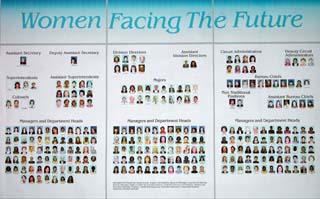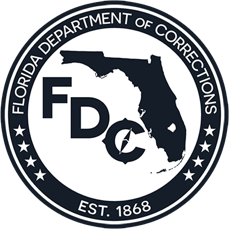1991
OFFENDER POPULATION JUNE 30, 1991
INMATES: 46,233
SUPERVISED: 101,679
INMATES: 46,233
SUPERVISED: 101,679
On April 12, 1991 Harry K. Singletary, Jr., is appointed Secretary of the Department of Corrections by Governor Lawton Chiles. His administration continues the focus on building additional prisons, increased staff training and takes a special interest in technology issues, Total Quality Management philosophy and diversifying the workforce. He will remain in this position for the next eight years (through January 4, 1999).
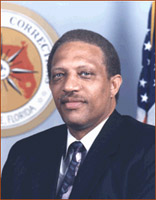
Harry K. Singletary, Jr.
Secretary, Dept. of Corrections
Click here to listen to Secretary Singletary describe his background in his own words.
WHEN HARRY MET LAWTON
The Unusual Appointment Process of Harry K. Singletary, Jr.
to Secretary of the Florida Department of Corrections
I received a call from the Governor's Office, setting an appointment time for me to meet with Governor Chiles face-to-face at the Governor's mansion. This meeting was concerning the position of Secretary of the Florida Department of Corrections. I had been through the interview process and was awaiting word about who would be appointed. I had no political influence or backing and I was counting on being selected because of my background and experience. But I had the ultimate support and that was God and the prayers of the righteous.
I met with Governor Chiles on Tuesday April 2, 1991 at 9 a.m. We exchanged pleasantries and he got down to business. He looked me in the eye and said, "Harry I have decided that I am going to offer the Secretary's position to someone else." He said, "I am told that you are a good prison man and I am sure there will be a place for you over there." I knew when I got the call that it was my last chance to make my case. I admired the fact that the Governor chose to deliver the bad news himself. When he informed me of my rejection, all fear left me and I was completely relaxed and without inhibitions. My mind said you have opportunity on your side; there is nothing worse he can say to you and you are prepared to make your case today. So go for it, Singletary.
I seized the moment and said, "Governor, I appreciate the opportunity you have given me to be involved in this process. It is just wonderful that I am here today and I am not cutting grass, waiting tables or washing dishes. Who would have ever thought 45 years ago the son of a sponger and a maid would be engaging the Governor in conversation? Governor, it is your call, but you are making a serious mistake. I am the only person I know within and without Florida who can make the changes you desire without having tremendous problems within the agency and institutions. I am in the agency and not of the agency. Whoever told you that I was a good prison man cheated you and did not fully brief you on my background." I ran down my resume and highlighted what I thought would give him a picture of my versatility. (Singletary taught corrections at Chicago State University and Loyola of Chicago. He has a master's degree in social work from the University of Chicago and he worked for 11 years in juvenile corrections in Illinois before returning to Florida in 1979 to work with adult offenders at the Florida Dept. of Corrections. As head of FDC Operations, he was responsible for overseeing the security functions of the Department. He was also on the Board of Trustees of Eckerd College.) The Governor listened intently, not speaking. I believe I spoke for 20 minutes. At the end of my soliloquy I got up, extended my hand and thanked him for the opportunity to apply and for him listening to me.
He said, "Hold on Harry, I think I have made a mistake. I believe I have selected the wrong man. Please don't tell anyone about this conversation. I need to make some changes." I said, "Governor, I cannot go home and not tell my wife and family." He said, "You can tell them, but no one else." I shook his hand and left.
A week later my staff advised me that I was to call Jack Peeples in the Governor's Office. We made an appointment for Thursday, April 11 at 11 a.m. I knew in my heart of hearts that the Governor had made the decision to appoint me. I was elated but reserved. I met with Jack at 11 a.m. He informed me that the Governor was scheduling a news conference for Friday, April 12 at 10 a.m. to announce my appointment. He said "I don't know what you said to the Governor to change his mind, but whatever it was it was powerful."
On the morning of my appointment, I had a difficult time lining up my butterflies, getting them in formation. I was nervous and sweaty. Even my socks were damp. I turned to the Governor and told him of my nervousness. He looked at me with those baby blues and said, "Any man that can come into my house without a job, convince me to change my mind and leave with a gift, does not need my help." He just laughed at me. Of course he was always there to help. I served Lawton Chiles for eight years. I earned his respect and affection and miss him, even today.
Harry K. Singletary, Jr.
Secretary
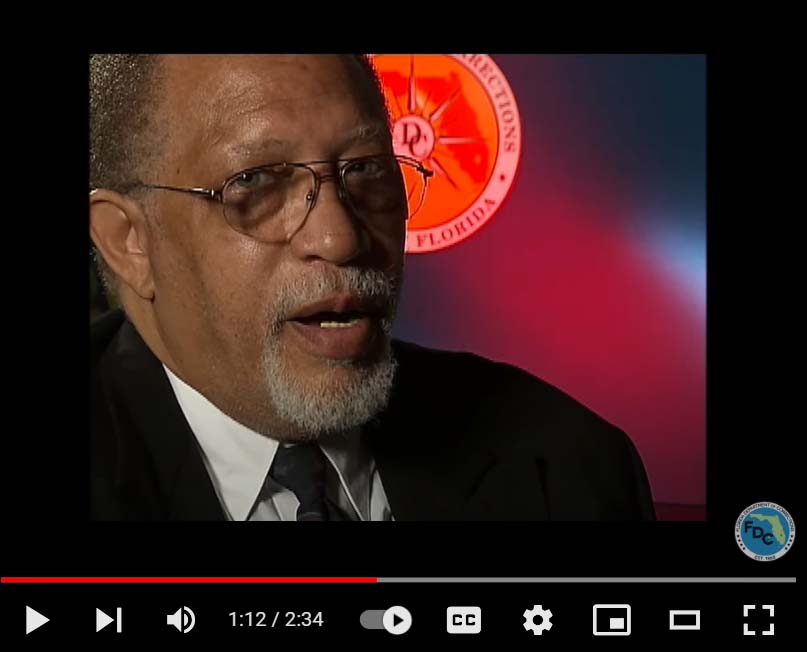 Click here to hear Secretary Singletary talk about being the first African-American Secretary of the Florida Department of Corrections.
Click here to hear Secretary Singletary talk about being the first African-American Secretary of the Florida Department of Corrections.
In January, Control Release replaces Provisional Credits (formerly Administrative Gaintime) as an early release mechanism. This represents a policy shift from a non-discretionary, statutorily mandated early release eligibility program run by the Department of Corrections to a discretionary early release program run by the Parole Commission requiring individual case review.
In April, Probation and Parole begins statewide implementation of the Investigative Tracking and Statistics Module, which had been piloted in 1990 in five judicial circuits around the state. Prior to this system, investigations performed by field staff had been tracked manually either by Kardex systems or a type of logbook which often led to a duplication of efforts in different offices throughout the state.
Century Correctional Institution (Century, FL), Gainesville Correctional Institution (Gainesville, FL), Hardee Correctional Institution (Bowling Green, FL), Jackson Correctional Institution (Malone, FL) and Jefferson Correctional Institution (Monticello, FL) open. The remaining two reception centers (Central Florida and South Florida) receive additions.
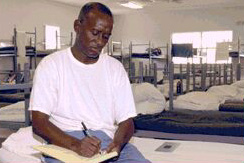
Inmate writes home.
In July 1991, The Community Corrections Partnership Act enhances offenders eligibility for Pretrial Intervention, creates Administrative Probation and Drug Offender Probation and raises the Community Control caseload to 25 to 1. Appropriations for community based drug treatment facilities are also provided. The Correctional Probation Specialist job classification is established to supervise high risk offenders. Electronic monitoring is expanded to all 20 judicial circuits.
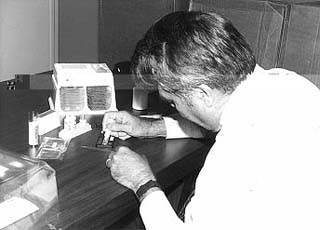
Correctional Probation Officer performs drug testing on offender's urine sample.
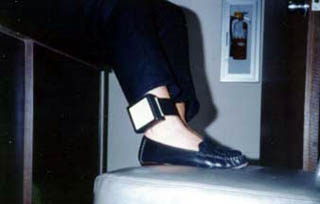
Electronic monitoring device worn around the ankle.
Community Corrections staff safety is enhanced with hand-held portable radios tuned to law enforcement frequencies; soft body armor (vests); non-flammable chemical agents for self defense and use against aggressive animals, and cellular telephones to provide instant communication in emergency situations. Probation and Parole field staff complete 186,360 investigations and receive specialized sex offender and substance abuse training.
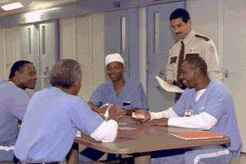
Inmates during recreation
The average percentage of sentence served by inmates released as of June 30 is 33.9% and begins its slow ascent.
The Department launches "Women Facing the Future," a training program presented by and for female correctional officers and employees. Its purpose is to promote professionalism, encourage networking and emphasize education for women in the corrections field. Thousands of women completed the program in its nine years of operation.
This Women Facing the Future poster illustrates the number of women in corrections in upper level or management positions who taught or took the class. Click for larger view (526K file).

(L to R) Levy Forestry Camp Major Lora Kuebler and Assistant Secretary for Community Corrections Tina Hayes were two of the many women who taught segments of Women Facing the Future.
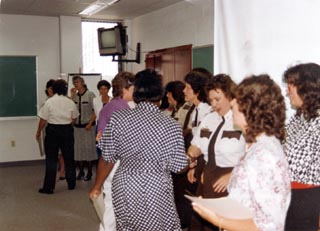
Women Facing the Future (WFF) meetings were held throughout the state to make it more convenient for participants, particularly correctional officers, to attend.
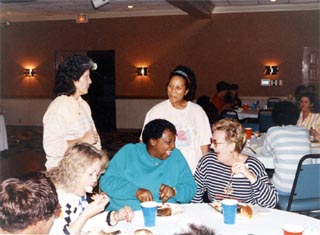
Women Facing the Future participants taking a break for lunch and sharing strategies for professional improvements.
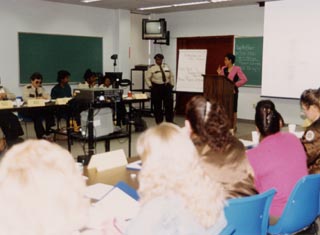
The two-day workshop was geared toward women in corrections, with an emphasis on professionalism, education and networking.
- 1821-1845
- 1868-1876
- 1877-1895
- 1900-1919
- 1921
- 1922-1924
- 1927
- 1928-1931
- 1932 | CHAPMAN
- 1933-1935
- 1936-1939
- 1940-1945
- 1946-1949
- 1950-1955
- 1956-1961
- 1962 | WAINWRIGHT
- 1963-1965
- 1966-1969
- 1970-1975
- 1976-1979
- 1980-1986
- 1987 | DUGGER
- 1988-1990
- 1991 | SINGLETARY
- 1992-1995
- 1996-1998
- 1999 | MOORE
- 2000-2002
- 2003 | CROSBY
- 2004-2005
- 2006 | MCDONOUGH
- 2007
- 2008 | MCNEIL
- 2009-2010
- 2011 | BUSS
- 2011 | TUCKER
- 2012 | CREWS
- 2013-2014
- 2014 | JONES
- 2015-2018
- 2019 | INCH
- 2020-2021
- 2021 | DIXON
- 2022-Today
- Population Summary Table

